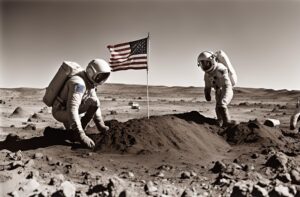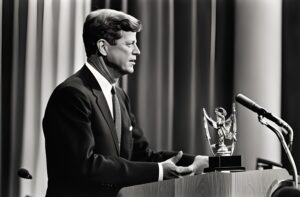
In a world where President John F. Kennedy was never assassinated, history took a remarkable turn. On November 22, 1963, in Dallas, a twist of fate altered the trajectory of the 20th century. As the motorcade wound through Dealey Plaza, a sudden mechanical failure in the would-be assassin’s rifle rendered the weapon useless. Kennedy, unaware of the close brush with death, continued his journey, waving to the crowds and smiling, oblivious to the alternate history that was unfolding.
Kennedy’s survival invigorated his presidency. With renewed vigor, he pushed forward his ambitious agenda. One of his most significant achievements was the passage of the Civil Rights Act of 1964. His charisma and political acumen enabled him to build a coalition of support that transcended party lines. The act, more comprehensive than its historical counterpart, outlawed discrimination in all public places, provided for equal employment opportunities, and established a federal commission to enforce civil rights. This landmark legislation not only accelerated the momentum of the Civil Rights Movement but also laid the foundation for a more inclusive society.

Kennedy’s second term was marked by a series of bold initiatives. Determined to win the space race, he doubled down on the Apollo program, setting an ambitious goal to land a man on Mars by the end of the decade. The American public, inspired by his vision, rallied behind the effort. In 1969, as the world watched in awe, astronauts Neil Armstrong and Buzz Aldrin planted the American flag on the Martian surface. The achievement not only cemented America’s dominance in space exploration but also sparked a new era of scientific and technological innovation.
On the international stage, Kennedy’s deft diplomacy averted several potential crises. His handling of the Cuban Missile Crisis had already demonstrated his ability to navigate the treacherous waters of Cold War politics. In the years that followed, he pursued a policy of détente with the Soviet Union, fostering a climate of cooperation rather than confrontation. The signing of the Strategic Arms Limitation Treaty (SALT) in 1970 marked a significant step towards reducing the threat of nuclear war. This era of relative peace allowed both superpowers to divert resources towards domestic development, leading to an unprecedented period of economic growth and stability.
Kennedy’s vision extended beyond the confines of Earth. His administration championed environmental conservation, recognizing the need to protect the planet for future generations. The establishment of the Environmental Protection Agency (EPA) in 1965 was a testament to his commitment to safeguarding natural resources. Under his leadership, the United States became a global leader in environmental policy, setting stringent standards for air and water quality, and promoting renewable energy sources. These efforts not only mitigated the impact of industrialization but also inspired other nations to adopt similar measures.
As the 1970s progressed, Kennedy’s influence continued to shape the world. His commitment to education led to the implementation of sweeping reforms, including the introduction of universal pre-kindergarten and free college tuition for all Americans. These initiatives leveled the playing field, providing opportunities for millions of young people and fostering a culture of innovation and creativity. The United States, now a beacon of progress and prosperity, attracted talent from around the globe, further fueling its ascent as a global superpower.

Kennedy’s legacy extended beyond his presidency. After leaving office in 1973, he continued to advocate for social justice and international cooperation. His establishment of the Kennedy Foundation for Global Peace and Development provided a platform for addressing pressing global issues, from poverty and disease to conflict resolution and climate change. His tireless efforts earned him the Nobel Peace Prize in 1975, cementing his status as one of the most influential figures of the 20th century.
In this alternate reality, the world was a vastly different place. The ripple effects of Kennedy’s survival were felt across every facet of society. The United States, under his leadership, emerged as a more just, prosperous, and innovative nation. The Cold War, though not entirely eradicated, was tempered by a spirit of cooperation and mutual respect. The advancements in science and technology, driven by the space race, ushered in a new era of exploration and discovery. And the global commitment to environmental conservation ensured that the planet remained a vibrant and habitable home for future generations.
As history unfolded, the name John F. Kennedy became synonymous with progress and possibility. His vision, leadership, and unwavering commitment to the betterment of humanity left an indelible mark on the world. The story of his presidency, untainted by tragedy, served as a testament to the power of hope, resilience, and the enduring human spirit.




